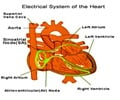Maiden multidisciplinary recommendations on the management of arrhythmias in patients with acute coronary syndromes (ACS) have been published.

Professor Bulent Gorenek (Turkey), chairperson of the task force, said: "Sudden cardiac death is the leading cause of death in Europe, the US and other developed countries. These deaths are mainly due to cardiac arrhythmias. This is the first document to provide clear recommendations on how to manage patients with ACS who develop arrhythmias. This topic has received limited coverage in guidelines and at congresses, and clinicians have many unanswered questions."
He added: "During the last decade the clinical approach to arrhythmia management in ACS has changed. Previously, antiarrhythmic drugs were the mainstay of treatment but today interventions in the cardiac catheterisation lab are preferred. This shift has been so substantial that EHRA, ACCA and the EAPCI established a task force to define the current position."
The position paper provides recommendations on how to identify ACS patients at risk for arrhythmias and how to manage tachy- and bradyarrhythmias using drugs, devices and catheter-based approaches.
Clear guidance is provided on the use of antiarrhythmic drugs in patients with ACS and ventricular arrhythmias. Amiodarone is recommended as the first line antiarrhythmic drug, with lidocaine added as second line if necessary. In patients with ACS without ventricular arrhythmias, the paper says that prophylactic antiarrhythmic drug treatment should not be administered.
Professor Gorenek said: "The use of antiarrhythmic drugs for the treatment of sustained ventricular arrhythmias in ACS has been the subject of strong debate. No big randomised trials have been conducted on this topic. Our recommendations will help clinicians prescribe the most appropriate antiarrhythmic drug for the situation."
Advertisement
Novel detailed recommendations are given on the use of antithrombotic therapy in patients with atrial fibrillation and ACS, catheter ablation in ACS patients with sustained ventricular arrhythmias, and management of patients with arrhythmias who are undergoing primary percutaneous coronary intervention (pPCI) for ST-elevation myocardial infarction (STEMI).
Advertisement
Professor Gorenek said: "The management of patients with ACS and cardiac arrhythmias requires a multidisciplinary approach involving specialists in acute cardiac care, interventional cardiology and electrophysiology. The recommendations in this document should help all clinicians who manage these patients to provide the best treatment available."
Source-Eurekalert















